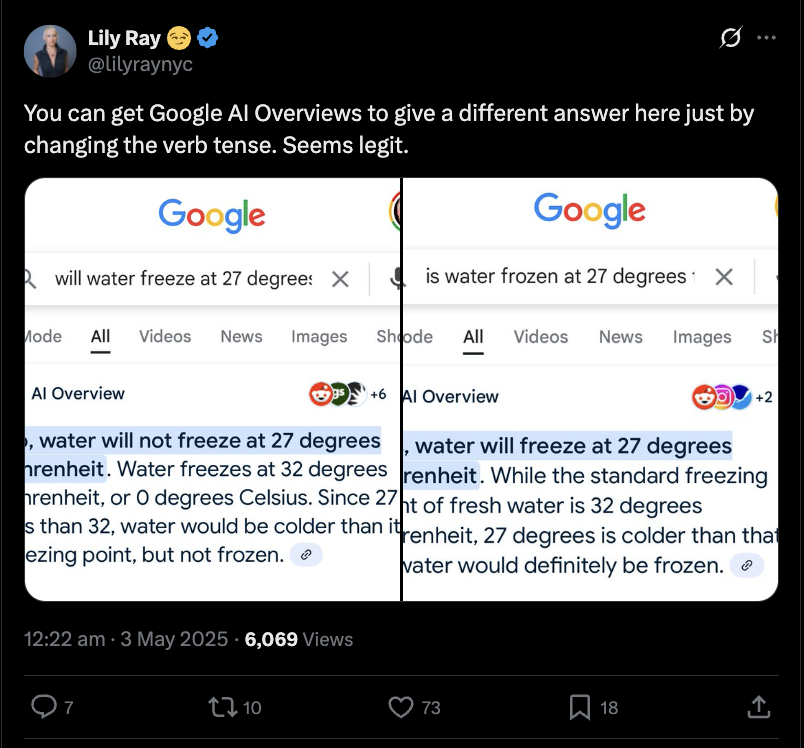Recent posts

The Great Outdoors
The Genetic Diversity Of Cannabis Seeds In South Africa
18 June 2025

Money Talks
Taking Out A Loan To Cover Urgent Expenses
17 June 2025

Money Talks
How To Choose the Right Payday Loan
16 June 2025

Temping
Why AI Won't Replace Graphic Designers
15 June 2025
Popular posts
Extravaganza
Trending Music Hashtags To Get Your Posts Noticed
24 August 2018
Geek Chic
How To Fix iPhone/iPad Only Charging In Certain Positions
05 July 2020
Extravaganza
Trending Wedding Hashtags To Get Your Posts Noticed
18 September 2018
Money Talks
How To Find Coupons & Vouchers Online In South Africa
28 March 2019
AI-Powered Overviews Are Nicking Your SERP Clicks
11 May 2025 | 0 comments | Posted by Che Kohler in nichemarket Advice
AI is so hot right now, hotter than the peak of Mugatus' derilict campaign, and like the inspiration for his campaign, SERPS have turned into a bit of a mess.
Google's and Bing's integration, nay obsession with putting AI overviews into search results, is changing how users interact with search engine results pages (SERPS).
I don't like it, you don't like it, I am not sure who does or finds them helpful, but there's no way to turn it off, and you're just going to have to deal with them or, dare I say it, use another search engine.
I know, imagine opening your browser and loading up DuckDuckGo, Startpage or Qwant as your gateway to the internet, it's madness.
While I, in my personal capacity, have long since moved over to alternative search engines, the masses won't move; this titan would much rather hit the iceberg, and businesses who rely on Google for traffic are polishing the brass.
As an SEO, I have to accept the reality that Google will remain the search engine of choice for the masses. Since launching AI Overviews (AIOs) in May, AI Overviews now appear in 42.5% of search results.
They sit above the fold in prime real estate, and if that's not enough, they often encourage users to perform multiple searches or link to other search links instead of external links, keeping users in SERPS longer.
To put it simply, Google SERPS are sticky and less externally clicky.
While overall search impressions continue to grow, publishers and website owners are facing a significant challenge:
Declining click-through rates (CTRS) as users increasingly find answers directly within Google's interface. This shift is forcing a recalibration of digital strategies and creating a new equilibrium for online traffic patterns.
The Zero-Click Search Revolution
Google's mission has previously been to organise the world's information and make it universally accessible. That was then, this now, the game has changed and Google has evolved to not just pointing users to information sources but directly providing answers through featured snippets, knowledge panels, and now AI-generated overviews.
This transformation mirrors what we've already witnessed with social platforms like Meta (formerly Facebook), which gradually positioned themselves as content gatekeepers rather than mere connectors.
Implementing AI overviews represents the latest and perhaps most significant step in gate closing and Google becoming stingier with its traffic.
The irony, of course, is that these machine-generated summaries aim to provide comprehensive answers to user queries without requiring clicks to external websites, and are in fact empowered by those websites' content.
Google is merely lifting the content from your pages into their pages and taking all the credit for the answer.
The result?
Users stay within Google's ecosystem longer, increasing the "stickiness" of the platform while simultaneously reducing traffic to third-party websites.
Chat are you seeing this? Are we cooked?
According to Search Engine Land the numbers are looking bleek. AI Overviews have decreased click-through rate (CTR) for traditional organic listings, according to the two studies:
- Ahrefs: A 34.5% drop in position 1 CTR when AI Overviews were present, based on an analysis of 300,000 keywords.
- Amsive: An average 15.49% CTR drop, with much larger losses in specific cases (e.g., -37.04% when combined with featured snippets), based on an analysis of 700,000 keywords.
Branded keywords have been less likely to trigger AI Overviews (only 4.79%) – but when they do, they get a +18.68% CTR boost, but if you're not an established brand or your brand traffic has been stagnant for some time, this isn't helpful.
What do you want us all to do? PR and above the line to drive brand-only traffic? Make it make sense!
Organic search traffic has always been about indexing your products and services and then extracting traffic through long-tail, semantic and the plethora of non-branded queries your customers are searching for.
If Google is giving users instant answers or instant product comparisons or instant product attributes, then that company blog you had is probably not doing the numbers it did in the past, now is it?
Understanding the Impact Across Query Types
The impact of AI overviews varies significantly depending on the nature of the search query:
Research Queries: Hardest Hit
Informational and research-oriented queries are experiencing the most dramatic decline in CTRs.
Previously, users searching for questions like "what causes climate change" or "how does blockchain work" would click through to multiple websites to gather comprehensive information.
Now, AI overviews provide synthesised answers drawn from various sources, eliminating the need to visit individual sites.
Educational content providers, reference sites, and blogs focused on explaining concepts are particularly vulnerable.
When Google's AI provides a thorough explanation directly in the SERP, the incentive to click through diminishes substantially.
It's not only the average eCommerce site or service provider getting hit on the back of the head and taken out behind the woodshed; no one is safe.
Publishers who have traditionally relied on these high-volume informational queries for traffic are seeing significant declines in visitor numbers, despite the queries themselves continuing to grow.
Soylent Green Is People
No one vets the repackaged slop you see on AI-Overviews; it's just uplifted from various sources and is prone to spitting out nonsense. It's extracted from whatever sources Gemini deems reliable, and poof, you have an answer, hallucinations and all.

Source: X - @lilyraynyc
If Google doesn't index your well-researched article despite having the correct answer, you're not going to be part of the overview; more often than not, it will be some know-it-all from Reddit getting the credit.
The average AI-overview reader doesn't understand the context; they're thinking these AI overviews are as good as those instant snippets pulled from top sites like we used to have in the past.
As long as they follow these texts, they will vomit blindly, and they'll never know that Soylent Green is made from people.
Blog Content: Squeezed in the Middle
Blog content occupies a middle ground in this new paradigm. Posts that focus primarily on answering straightforward questions are increasingly cannibalised by AI overviews.
However, blogs offering unique perspectives, original research, or in-depth analysis beyond what an AI summary can provide still retain some advantage.
The challenge for bloggers is that even when their content is used as a source for AI overviews, they rarely receive the traffic or subsequent ad revenue that would have come from direct visits.
This creates a paradoxical situation where content creators fuel the very system that diverts traffic away from their sites.
Product Searches: A Potential Bright Spot
Interestingly, e-commerce and product-related sites may actually benefit from this new landscape. When users search for products, AI overviews can quickly educate them about features, comparisons, and considerations—essentially qualifying leads before they click through to retail sites.
This means that while overall product search CTRs might decrease, the quality of those clicks often improves. Users who do click through are further along in the purchase journey, having already done their initial research directly in the SERP.
They're less likely to be "window shopping" and more likely to be comparing specific alternatives or ready to make a purchase decision.
For e-commerce sites, this translates to potentially higher conversion rates even if raw traffic numbers decline. Users arriving at product pages are more informed, more intentional, and closer to completing a transaction.
The Economics of the New Equilibrium
This transformation is forcing a reconsideration of the economic relationship between search engines and content creators.
The traditional implicit bargain—websites create valuable content and search engines direct users to it—is breaking down as search engines increasingly extract and present the value of that content without directing the accompanying traffic.
What's the incentive to create content or index within Google if I am not getting any clicks?
Several economic shifts are taking place:
- Declining ad revenue for publishers: With fewer pageviews, websites that monetise through display advertising are seeing significant revenue decreases.
- Increased competition for remaining clicks: As overall CTRs decline, competition for the remaining clicks intensifies, potentially driving up costs in paid search auctions.
- Value migration to transaction points: Sites that can monetise through direct sales or lead generation rather than ad impressions are better positioned to weather this change.
- Premium content models gaining traction: As free, ad-supported content becomes less economically viable, subscription and paywalled models may become more attractive alternatives.
Adapting to the New Landscape
For content creators and website owners, some will have to accept this is the final nail in the coffin; this drying up of clicks will put certain sites out of business, which were already scraping for traffic and running on the margins.
For those that survive the change over adapting to this new reality requires strategic pivoting rather than fighting against the tide.
For Research and Educational Content Providers:
- Create content that goes beyond what AI can summarise, offering unique insights, proprietary data, or interactive elements.
- Focus on building direct audience relationships through newsletters, communities, or membership models rather than relying solely on search traffic.
- Consider how to make your content valuable for AI training while still preserving reasons for users to visit your site.
- Creating brand-focused content that cannot be replicated by competitors or LLMs
- Creating content with more of a social aspect, instead of only trying to rank, create content that has appeal within social trends and feeds.
For Bloggers:
- Develop content that answers questions AI overviews can't adequately address, particularly those requiring subjective judgment, personal experience, or specialised expertise.
- Strengthen your unique voice and perspective—elements that AI summaries struggle to replicate authentically.
- Build multi-format content strategies that include video, podcasts, and other mediums that complement text-based information.
For E-commerce and Product Sites:
- Optimise for bottom-of-funnel searches where users are comparing specific products or looking for purchase information.
- Focus on conversion optimisation since traffic quality may improve even as quantity decreases.
- Enhance product pages with unique value propositions that go beyond the factual information AI overviews can provide.
The Future Equilibrium
Are we witnessing the early stages of a realignment in the digital ecosystem?
We don't know! If this trend persists, the new equilibrium will likely feature:
- A more segmented search landscape: Different types of queries will have dramatically different CTR patterns.
- New compensation models: As the value exchange between search engines and content creators shifts, new economic models may emerge to ensure the continued production of high-quality content.
- Hybrid content strategies: Successful publishers will need to balance creating content that functions well within AI systems while still offering compelling reasons for direct visits.
Alternatively, Google and Bing find that these results are not cost-effective to serve, and they pull back, giving traditional link lists more above-the-line real estate.
When Will This Nightmare End?
The growth in overall search volume means opportunities still exist, but they're taking new forms.
For web publishers and marketers, understanding and adapting to these changing traffic patterns isn't just about survival—it's about finding new ways to thrive in an AI-augmented search landscape.
You'll have to dig deep into your data, and get to grips with the new relationship between impressions and clicks in your niche. If you previously had a 5% CTR and it's dropped down to 2-3%, then you need to find keywords with impressions below that range and try to improve those rankings.
It's not going to be easy, and it's going to be costly, but if it's cheaper than loading up on ads to supplement traffic, then it's still worth the effort.
Contact us
If you would like us to improve the performance of your organic search or want to know more about digital marketing for your business, then don’t be shy. We’re happy to assist. Simply contact us
Are you looking to promote your business?
Business owners can create their free business listings on nichemarket. The more information you provide about your business, the easier it will be for your customers to find you online. Registering with nichemarket is easy; all you will need to do is head over to our sign-up form and follow the instructions.
If you require a more detailed guide on how to create your profile or your listing, then we highly recommend you check out the following articles.
Recommended reading
If you enjoyed this post and have a little extra time to dive deeper down the rabbit hole, why not check out the following posts on SEO and search updates.
You might also like
The Return of Rattan in June Home Makeovers
09 June 2025
Posted by Lupka Atanasova in Constructive Criticism
Rediscover rattan! This "Woven Wonder" is back for June home makeovers in South Africa, adding natural style and warmth to any space. Find out why al...
Read moreSA's Financial Frontier: Business Growth Through Trading
23 May 2025
Posted by Gabriela Pelayes in Money Talks
A look at South Africans' take towards financial inclusion with self-directed trading and how that has fueled the growth of online trading applicatio...
Read more{{comment.sUserName}}
{{comment.iDayLastEdit}} day ago
{{comment.iDayLastEdit}} days ago
 {{blogcategory.sCategoryName}}
{{blogcategory.sCategoryName}}


